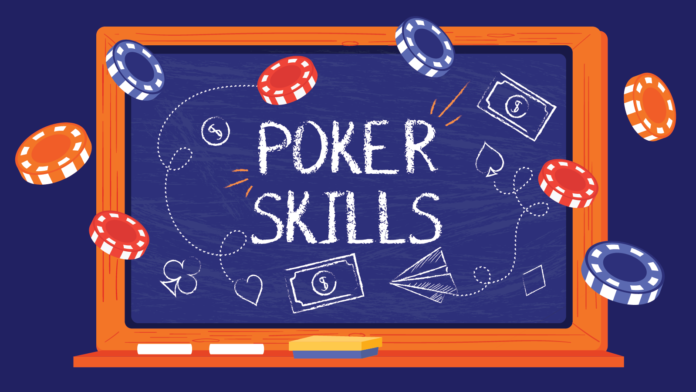The popularity of poker games has surged in recent years, attracting players from various backgrounds. This guide provides a comprehensive overview of poker, including the different variations and how to set up your own game. Poker combines skill, strategy, and luck, with players competing to win the pot by betting based on the value of their hand. Texas Hold’em is the most popular variant, but there are numerous others to explore. When setting up your game, consider whether you want to play a cash game or a tournament, and determine the buy-in amount and table limits. Learning the rules and practicing different strategies are crucial for success. Continuously improving your skills, avoiding common mistakes, and managing your bankroll wisely are key factors in becoming a proficient player. Ultimately, poker offers an exciting experience that requires dedication, adaptability, and enjoyment of the game.
Understanding the Different Poker Game Variations

If you’re new to the world of poker games, you’re in for an exciting journey! Poker is a popular card game that has captivated players across the globe for decades. Whether you want to play for fun with friends or dive into competitive tournaments, understanding the fundamentals of poker is essential.
Poker games come in various forms, each with its own set of rules and strategies. From Texas Hold’em to Omaha, there is a wide range of poker game variations to choose from. These games involve a combination of skill, strategy, and a bit of luck.
Whether you’re a beginner or an experienced player looking to brush up on your skills, this beginner’s guide to poker games will provide you with the knowledge you need to get started. We’ll walk you through the basic rules and gameplay, essential strategies, and valuable tips for improving your poker skills. By the end, you’ll have a solid foundation to enjoy the exciting world of poker games. So, grab your deck of cards and let’s dive into the thrilling realm of poker!
How to Get Started: Setting Up Your Poker Game
Poker is a popular card game that combines strategy, skill, and luck. There are various game variations to suit every player’s preference. Texas Hold’em is one of the most played variations, where players receive two private cards and five community cards are dealt on the table. Omaha Hold’em is similar, but players receive four private cards and must use two of them and three community cards to form their hand. For a faster-paced experience, speed poker allows players to quickly fold their hand and move to a new table. With so many options, each game variation offers a unique and exciting poker experience.
The Basic Rules and Gameplay of Poker

How to Get Started: Setting Up Your Poker Game
If you’re new to poker games and eager to dive into this thrilling world of strategy and excitement, the first step is setting up your game. Whether you prefer to play online or gather your friends for a round of live poker, there are a few key elements to consider.
If you opt for online poker, the popular platform offers a wide range of poker games to suit every player’s preference. From Texas Hold’em to Omaha and more, you’ll find a variety of exciting variations to explore. To get started, simply download the software, create an account, and get ready to test your skills against players from around the world.
For those who prefer the traditional feel of a live poker game, gathering your friends for a friendly competition can be a great way to spend an evening. All you need is a deck of cards, a poker table, and some snacks to keep you fueled throughout the game. Whether you’re a beginner or an experienced player, poker games offer endless opportunities for fun, camaraderie, and the chance to test your strategic thinking.
Essential Poker Strategies for Casual Players

Developing a solid poker strategy starts with understanding the basic rules and gameplay of the game. Familiarize yourself with the different hand rankings, such as flushes, straights, and full houses. Knowing the odds of winning different hands can help you make better decisions during the game. Additionally, observe your opponents’ moves and analyze their playing styles. This will give you insights into their strategies and allow you to adjust yours accordingly.
One essential strategy is to manage your bankroll wisely. Set a budget for each game and stick to it. This will prevent you from overspending and help you avoid significant losses. Another crucial aspect is maintaining a calm and composed demeanor throughout the game. Keeping your emotions in check will prevent you from making impulsive and reckless decisions. Finally, never underestimate the power of practice. Regularly playing poker games, both online and offline, will sharpen your skills and enable you to become a proficient poker player. Remember, with dedication and perseverance, anyone can become successful at poker games.
Tips for Improving Your Poker Skills

Whether you are a beginner or an experienced player, there are common mistakes in poker games that you should avoid. Playing too many hands is a frequent error that can be costly. It is essential to assess the strength of your hand and consider your position at the table before deciding to play. By being selective and only playing hands with a high chance of winning, you can improve your success rate.
Another mistake to avoid is not managing your bankroll properly. Setting a budget before starting to play is crucial. By sticking to your budget, you can prevent yourself from betting more than you can afford to lose. Additionally, practicing discipline and knowing when to fold can help protect a significant portion of your bankroll.
In summary, avoiding common mistakes in poker games will enhance your overall gameplay and increase your likelihood of winning. Play strong hands and manage your bankroll effectively to become a skilled poker player.
Poker games have been popular worldwide for many years and it is important to understand the various variations of poker in order to become a successful player. There are several types of poker games to choose from, each with its own rules and gameplay. Setting up the game properly involves selecting the right number of players, determining the stakes, and organizing the seating arrangement. Knowing the basic rules and gameplay, such as hand rankings and betting structure, is crucial. For casual players looking to improve their skills, strategies like reading opponents, managing bankroll, and knowing when to be aggressive or conservative are important. Practice, continuous learning, and avoiding common mistakes can help improve overall poker skills.










